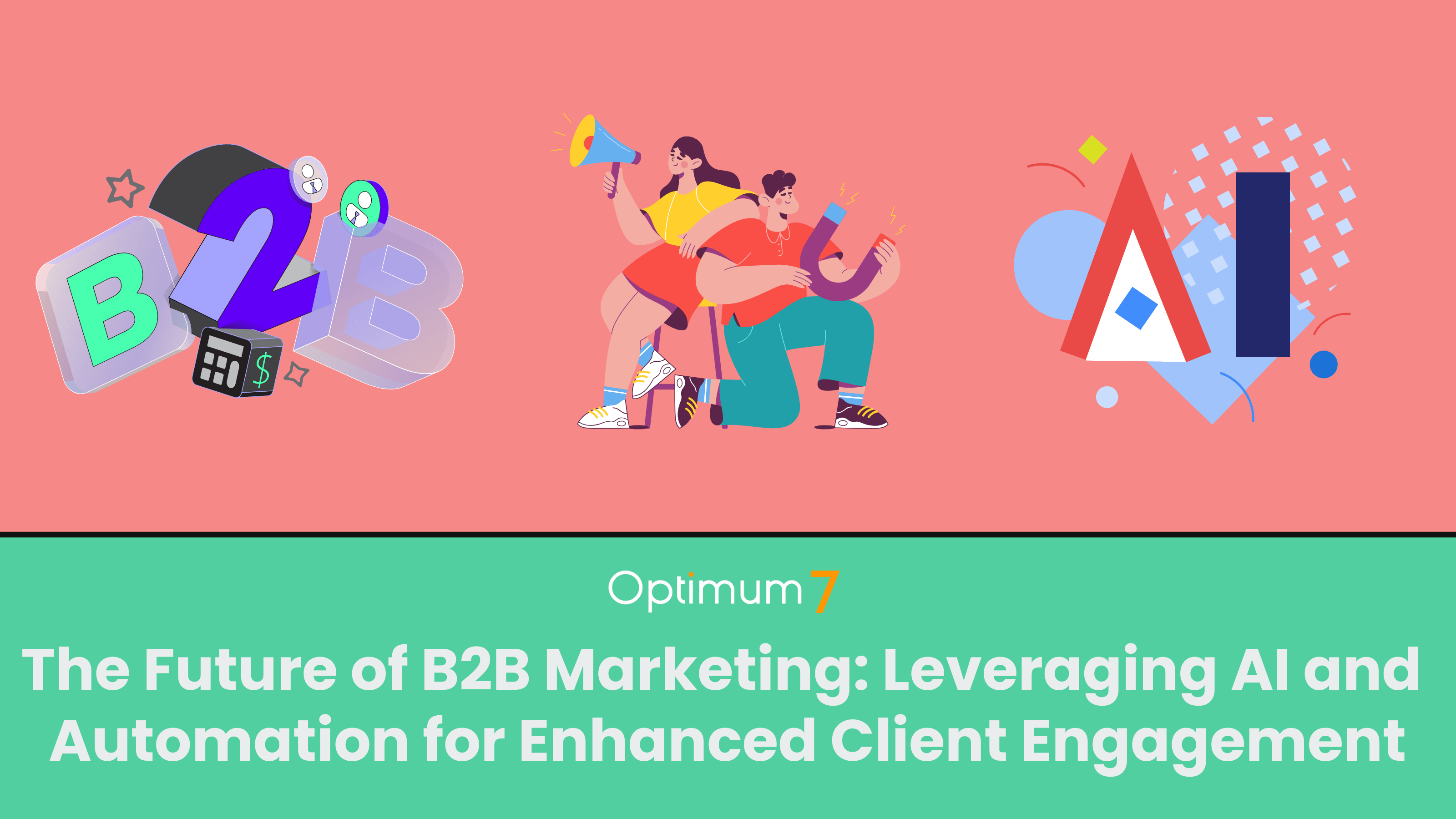By 2025, AI-driven businesses will account for 80% of all B2B sales interactions. This statistic underscores the transformative potential of AI and automation in B2B marketing.AI and automation are not just trends; they are becoming indispensable in B2B strategies. These technologies allow businesses to operate with greater efficiency, gain deeper insights into customer behavior, and deliver highly personalized experiences at scale. This competitive edge is crucial in an increasingly crowded market.
This article explores how AI and automation can revolutionize client engagement in B2B marketing. We will start by defining these technologies and their roles. We’ll examine current trends and the significant benefits they offer, such as enhanced data analytics, improved efficiency, and personalized marketing. Practical strategies for implementation will be provided, along with detailed case studies to illustrate successful applications. Our goal is to equip businesses with actionable insights to effectively integrate AI and automation, ultimately enhancing client engagement and driving growth.
Understanding AI and Automation in B2B Marketing
AI (Artificial Intelligence) and automation are transforming the landscape of B2B marketing. AI involves the use of advanced algorithms and machine learning to analyze data, make predictions, and automate decision-making processes. Automation, on the other hand, refers to the use of technology to perform tasks with minimal human intervention, streamlining workflows and improving efficiency.
AI encompasses technologies like machine learning, natural language processing, and computer vision.In B2B marketing, AI is used for predictive analytics, customer segmentation, and personalized content delivery. Automation involves tools and platforms that handle repetitive tasks such as email marketing, social media management, and lead nurturing.It allows marketing teams to focus on strategic activities by reducing the time spent on routine processes.
Current trends indicate a rapid increase in the adoption of AI and automation in B2B marketing:
- AI Investments: More companies are investing in AI technologies to gain a competitive edge. For example, spending on AI systems is projected to reach $97.9 billion by 2023.
- Marketing Automation Platforms: The use of platforms like HubSpot, Marketo, and Salesforce is growing. These platforms automate complex marketing tasks, providing real-time analytics and insights.
- Personalization at Scale: AI enables personalized marketing campaigns by analyzing vast amounts of data to understand customer preferences and behaviors. This leads to higher engagement rates and better customer experiences.
AI algorithms analyze large datasets to uncover patterns and trends that humans might miss. This helps businesses make data-driven decisions, improving marketing strategies and outcomes. Automation handles repetitive tasks, freeing up time for marketing teams to focus on creative and strategic initiatives. This leads to increased productivity and faster execution of marketing campaigns.AI enables businesses to create highly personalized marketing messages and offers based on individual customer data. This level of personalization was previously unattainable and results in higher engagement and conversion rates.
AI-Powered Tools and Technologies
The integration of AI and automation in B2B marketing relies on various tools and technologies designed to enhance different aspects of marketing operations.
Collecting and Processing Data, AI tools gather data from multiple sources, clean it, and organize it for analysis. Analyzing Customer Behavior, AI algorithms analyze customer interactions and behaviors to predict future actions and preferences. Generating Insights, Tools like Google Analytics with AI capabilities, HubSpot, and Salesforce Einstein provide actionable insights that help businesses tailor their marketing strategies.
Automated marketing platforms streamline various marketing activities, including:
- Email Marketing: Platforms like Mailchimp and ActiveCampaign automate email campaigns, segment audiences, and track performance.
- Social Media Management: Tools like Hootsuite and Buffer schedule posts, monitor engagement, and analyze social media metrics.
- Lead Management: Systems like Marketo and Pardot automate lead scoring, nurturing, and management, ensuring timely and relevant communication with prospects.
Chatbots and virtual assistants enhance client interactions by:
Providing 24/7 Support, Chatbots like Drift and Intercom offer round-the-clock customer service, handling common queries and issues. Improving Response Times, These tools provide instant responses to customer inquiries, improving the overall user experience. Enhancing Engagement, Virtual assistants like IBM Watson Assistant personalize interactions by understanding context and user intent, leading to more meaningful conversations.
In summary, AI and automation are reshaping B2B marketing by enhancing data analytics, improving efficiency, and enabling personalized marketing. Understanding and leveraging these technologies through the right tools can significantly boost client engagement and drive business growth.
Strategies for Implementing AI and Automation
Implementing AI and automation in B2B marketing requires a strategic approach to ensure successful integration and maximum benefits. Here are key strategies to guide businesses through this process.
Before adopting AI and automation, it is crucial to identify the specific needs and pain points within your organization. This involves:
Conducting a Needs Assessment, Evaluate current marketing processes to identify inefficiencies and areas that can benefit from automation and AI. Analyzing Customer Data, Understand customer behavior, preferences, and pain points to determine how AI can enhance customer engagement. Setting Clear Objectives, Define what you aim to achieve with AI and automation, such as improving lead generation, enhancing customer support, or increasing personalization.
Selecting the appropriate AI and automation tools is vital for effective implementation. Consider the following criteria:
- Scalability: Ensure the tools can grow with your business and handle increasing data volumes and user demands.
- Ease of Integration: Choose tools that can seamlessly integrate with your existing systems, such as CRM, ERP, and other marketing platforms.
- User-Friendliness: Opt for tools that are intuitive and easy to use, reducing the learning curve for your team.
- Cost-Effectiveness: Evaluate the cost of the tools relative to the value they bring to your business.
Examples of popular tools include: Marketo, Known for robust lead management and marketing automation capabilities. Pega, Offers AI-driven decisioning and process automation. Microsoft Dynamics 365, Provides a comprehensive suite of AI and automation features integrated with CRM and ERP systems.
For AI and automation to be effective, they must be seamlessly integrated into existing workflows, and employees must be adequately trained. Key steps include; System Integration, Work with IT and vendor support to ensure new tools integrate smoothly with your current systems. This may involve custom APIs or middleware. Training Programs, Develop comprehensive training programs to help employees understand and utilize the new technologies. This can include workshops, online courses, and hands-on sessions. Ongoing Support, Provide continuous support and resources to address any issues and keep the team updated on new features and best practices.
Real-World Examples of Successful AI and Automation Implementations
There are numerous real-world examples of successful AI and automation implementations across various industries. Here are some notable case studies that illustrate the transformative impact of these technologies:
Intelligent Automation
- Aon Italy (Professional Services)
– Vendor: IBM
– Results: Automation eased the workloads of the company’s 1,600 employees, enhancing operational efficiency.
- Cobmax Sales Center (Telecommunications)
– Vendor: IBM
– Results: Reduced client reports completion time from 2-3 days to just 1 day, significantly speeding up service delivery.
- Credigy Solutions Inc. (Financial Services)
– Vendor: IBM
– Results: Achieved 100% automation of due diligence reviews for loan-related documents, streamlining the review process and reducing manual errors.
Industrial AI Case Studies
- Mate Gauge (Manufacturing)
– Application: Implemented non-contact laser measurement solutions to acquire accurate measurements in manufacturing facilities, improving quality control and efficiency.
- SVT (Virtual Reality)
– Application: Utilized high-speed cameras and AI to create immersive VR experiences for sports fans, enhancing engagement and customer experience.
- Danfoss (Robotics)
– Application: Adopted 3D vision solutions to improve production line efficiency, demonstrating the effectiveness of AI in automating complex manufacturing tasks.
AI in Business Transformation
- KLM Royal Dutch Airlines (Customer Service)
– Solution: Introduced an AI-powered chatbot named BlueBot on Facebook Messenger, handling around 60% of customer queries autonomously. This implementation has significantly improved customer service efficiency and satisfaction by allowing human agents to focus on more complex issues.
- Coca-Cola (Marketing)
– Solution: Employed an AI marketing platform called Albert to optimize digital advertising campaigns. This AI system analyzes customer data to make real-time adjustments, resulting in increased ROI and more effective targeting of profitable customer segments.
- Siemens (Industrial Automation)
– Solution: Utilized AI-driven solutions for predictive maintenance and process optimization in manufacturing. This approach has led to increased productivity, reduced downtime, and enhanced quality in industrial operations, showcasing AI’s role in advancing manufacturing efficiency.
These case studies highlight how AI and automation are being effectively integrated into various sectors, driving efficiency, enhancing customer experiences, and optimizing operational processes.
Successful AI and automation implementations can lead to measurable outcomes such as: Increased ROI, Higher returns on marketing investments through improved targeting and efficiency. Enhanced Customer Satisfaction, Better customer experiences resulting in higher satisfaction and loyalty. Operational Efficiency, Reduced manual workload and faster execution of marketing tasks.
In summary, implementing AI and automation in B2B marketing involves identifying business needs, choosing the right tools, and ensuring seamless integration and training. Learning from successful case studies can provide practical insights and highlight the significant benefits these technologies can bring.
Challenges and Solutions
While AI and automation offer substantial benefits in B2B marketing, their implementation can present several challenges. Understanding these challenges and how to overcome them is crucial for successful integration.
Common Challenges
- Data Privacy Concerns:
- Challenge: Collecting and processing large volumes of customer data raises privacy and security concerns.
- Impact: Potential breaches can lead to loss of customer trust and legal penalties.
- High Initial Costs:
- Challenge: Implementing AI and automation tools often requires significant upfront investment.
- Impact: This can be a barrier, especially for small and medium-sized businesses with limited budgets.
- Resistance to Change:
- Challenge: Employees may resist adopting new technologies due to fear of job loss or discomfort with change.
- Impact: Resistance can slow down implementation and reduce the effectiveness of the new tools.
- Integration Complexities:
- Challenge: Integrating AI and automation tools with existing systems can be technically complex and time-consuming.
- Impact: Poor integration can lead to data silos and inefficient workflows.
Overcoming Barriers
- Ensuring Data Privacy and Security:
- Solution: Implement robust data security measures, including encryption, access controls, and regular audits.
- Best Practice: Stay compliant with regulations such as GDPR and CCPA to protect customer data.
- Justifying and Managing Costs:
- Solution: Conduct a cost-benefit analysis to demonstrate the ROI of AI and automation investments.
- Best Practice: Start with scalable solutions and pilot projects to manage costs effectively.
- Addressing Resistance to Change:
- Solution: Foster a culture of innovation by involving employees in the decision-making process and providing thorough training.
- Best Practice: Highlight success stories and the personal benefits of new technologies to gain buy-in.
- Simplifying Integration:
- Solution: Work with vendors that offer strong support and integration services. Use APIs and middleware to facilitate smooth integration.
- Best Practice: Plan the integration process carefully, involving both IT and marketing teams to ensure alignment.
The future of AI and automation in B2B marketing is promising, with several trends expected to shape the landscape: Advanced Personalization, AI will enable even more precise and personalized marketing strategies, leveraging real-time data and predictive analytics. Increased Use of Voice and Visual Search, As voice and visual search technologies advance, AI will play a key role in optimizing content for these formats. Enhanced Customer Experience, Automation will further streamline customer journeys, providing seamless and intuitive interactions across multiple channels.
Conclusion
AI and automation are revolutionizing B2B marketing by enhancing data analytics, improving efficiency, and enabling personalized marketing at scale. Despite the challenges, businesses that strategically implement these technologies can achieve significant competitive advantages.
In summary, the key points discussed include the definitions and roles of AI and automation, current trends, benefits, strategies for implementation, and real-world case studies. Overcoming challenges such as data privacy, high costs, resistance to change, and integration complexities is crucial for success.
Businesses are encouraged to start integrating AI and automation by identifying their specific needs, selecting the right tools, and ensuring seamless integration and training. The future of B2B marketing lies in leveraging these technologies to enhance client engagement and drive growth. By staying ahead of the curve and continuously adapting to new advancements, businesses can thrive in an increasingly competitive market.
Additional Resources
To further improve your understanding of the implementation of AI and automation in B2B marketing, here are some great resources and tools to consider:
“Artificial Intelligence in Marketing: Practical Applications” by Jim Sterne. This book provides a comprehensive overview of how AI can be applied in marketing, with practical examples and case studies.“Marketing Automation for Dummies” by Mathew Sweezey. A beginner-friendly guide that covers the basics of marketing automation and provides actionable tips for implementing automation strategies.
“Predictive Analytics: The Power to Predict Who Will Click, Buy, Lie, or Die” by Eric Siegel. An insightful book that delves into predictive analytics, a critical component of AI, and how it can be leveraged to make data-driven marketing decisions. Harvard Business Review Articles on AI and Automation, Regularly updated articles that explore the latest trends, research, and case studies related to AI and automation in business.
A comprehensive marketing, sales, and service platform that offers a suite of tools for CRM, marketing automation, and analytics. It is user-friendly and scalable, making it suitable for businesses of all sizes. A powerful marketing automation platform that provides advanced lead management, email marketing, and analytics capabilities. It is designed for businesses looking to scale their marketing efforts and achieve higher ROI.
An AI-driven platform that integrates with Salesforce CRM, offering predictive analytics, personalized marketing, and automation features. It helps businesses understand customer behavior and make informed decisions. A robust platform that combines AI and automation to streamline marketing, sales, and customer service processes. It offers decisioning and process automation tools that enhance operational efficiency.
A popular email marketing and automation platform that helps businesses create, send, and analyze email campaigns. It offers segmentation, personalization, and analytics features to improve engagement. A conversational marketing platform that uses AI-powered chatbots to engage website visitors, qualify leads, and provide 24/7 customer support. It enhances real-time communication and improves customer experience.
AI in Marketing by Coursera, This course, offered by the University of Virginia, covers the fundamentals of AI and its applications in marketing. It includes practical exercises and case studies.
Marketing Automation Certification by HubSpot Academy, A free certification course that teaches the basics of marketing automation, including how to create automated workflows and measure their effectiveness.
Salesforce Einstein Analytics Certification, A certification program that provides in-depth training on using Salesforce Einstein for predictive analytics and AI-driven decision-making.
Data Science and Machine Learning Bootcamp by Udemy, An extensive bootcamp that covers data science, machine learning, and their applications in business, including marketing.
By leveraging these resources, tools, and courses, businesses can deepen their understanding of AI and automation, stay updated with the latest trends, and implement effective strategies to enhance client engagement. These resources provide practical knowledge and actionable insights to help businesses navigate the complexities of AI and automation in B2B marketing.
In conclusion, the future of B2B marketing lies in the strategic implementation of AI and automation. By understanding the benefits, overcoming challenges, and utilizing the right tools and resources, businesses can achieve significant competitive advantages, drive growth, and enhance client engagement.






